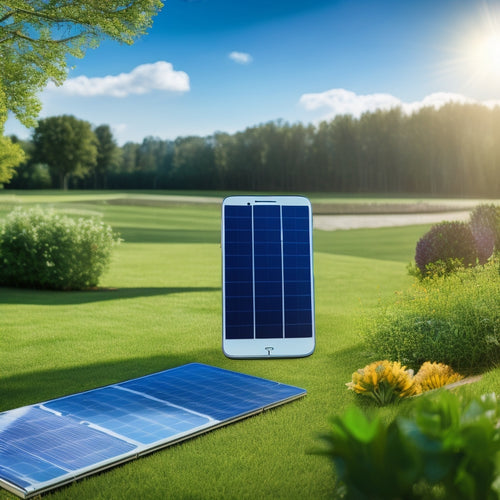
5 Tips for Solar-Powered EV Charging Success
Share
To guarantee solar-powered EV charging success, you'll want to assess your energy needs by calculating your daily energy requirements and tracking your mileage. Choose high-efficiency solar panels with a suitable mounting option, and design a seamless connection for efficient energy transmission. Monitor and optimize your system's performance using real-time data analytics, and plan for energy storage using a battery system. By following these steps, you'll be well on your way to harnessing the power of solar energy for your EV. As you continue on this path, you'll uncover more ways to optimize your system and reap the benefits of sustainable energy.
Key Takeaways
• Assess your daily energy needs by calculating your EV's energy requirements and tracking your mileage to optimize energy consumption patterns.
• Choose high-efficiency solar panels (20% or higher) that are compatible with your mounting option and suitable for your property's conditions.
• Design a seamless connection between your solar panels and EV charging station using wireless technology and a smart grid approach to minimize energy loss.
• Monitor your system's performance in real-time, tracking key indicators like energy output and charging speed to identify areas for optimization.
• Integrate energy storage into your system to capitalize on excess energy generated during the day and prioritize battery maintenance for peak performance.
Assess Your Energy Needs
To determine the feasibility of solar-powered EV charging, you must first calculate your total energy requirements, including your daily driving habits and the type of electric vehicle you own.
This evaluation is essential in ensuring energy efficiency and optimizing your solar-powered EV charging system.
Start by tracking your daily mileage and identifying your EV's energy consumption pattern. This will give you a clear understanding of your energy needs.
Next, consider the capacity of your solar panel array and the amount of energy it can generate.
A thorough cost analysis is also vital in determining the viability of solar-powered EV charging. Calculate the upfront costs of installing the system, as well as the long-term savings on your energy bills.
By doing so, you'll be able to determine the payback period of your investment and make an informed decision.
Choose the Right Solar Panels
With your energy needs assessed, you're now ready to select the ideal solar panels that will efficiently power your EV charging system.
When choosing the right solar panels, consider the panel efficiency, which greatly impacts the overall performance of your system. Look for high-efficiency panels with a rating of 20% or higher to maximize energy production. This will guarantee you're generating enough power to support your EV charging needs.
Additionally, consider the mounting options for your solar panels. You'll need to decide between a roof-mounted or ground-mounted system. Roof-mounted systems are ideal for homes with ample rooftop space, while ground-mounted systems offer more flexibility and easier maintenance.
Verify that your chosen mounting option is compatible with your solar panel selection and suitable for your property's conditions.
Design a Seamless Connection
You'll need to guarantee a seamless connection between your solar panels and EV charging station to optimize energy transmission and minimize energy loss.
A well-designed connection facilitates that the energy generated by your solar panels is efficiently transmitted to your electric vehicle, reducing the strain on the grid and your wallet.
To achieve this, consider integrating wireless technology into your system, allowing for real-time monitoring and control of energy flow.
This smart grid approach enables you to optimize energy distribution, reduce waste, and maximize the benefits of solar power.
By streamlining the connection between your solar panels and EV charging station, you'll be able to charge your vehicle efficiently and sustainably.
A seamless connection also enables you to monitor and adjust energy usage in real-time, guaranteeing that you're getting the most out of your solar-powered EV charging system.
Monitor and Optimize Performance
By monitoring your solar-powered EV charging system's performance in real-time, you can pinpoint areas for optimization, ensuring that your clean energy investment operates at maximum efficiency. With data analytics, you can track key performance indicators such as energy output, charging speed, and system downtime. This data enables you to identify bottlenecks and make adjustments to optimize your system's performance.
| Metric | Target | Current |
|---|---|---|
| Energy Output (kWh) | 500 | 450 |
| Charging Speed (kW) | 22 | 20 |
| System Downtime (%) | < 1 | 1.5 |
Plan for Energy Storage
Integrating energy storage into your solar-powered EV charging system allows you to capitalize on excess energy generated during the day for later use, reducing your reliance on the grid and guaranteeing a steady supply of clean energy.
With a battery storage system, you can store excess energy generated during the day and use it to charge your EV at night or during periods of low solar production. This not only maximizes your energy usage but also enhances grid resiliency by reducing peak demand on the grid.
To guarantee peak performance, prioritize battery maintenance by monitoring your battery's state of charge, depth of discharge, and charging cycles. Regular maintenance will help extend the lifespan of your batteries and facilitate efficient energy storage.
Frequently Asked Questions
Can I Use Any Type of Electric Vehicle With Solar-Powered Charging?
As you set out on an eco-friendly journey, you'll find that not all electric vehicles are created equal when it comes to solar-powered charging. You'll need a vehicle with compatible charging capacity to harness the sun's energy efficiently.
How Often Should I Clean My Solar Panels to Maintain Efficiency?
You should clean your solar panels every 2-3 months to prevent panel degradation, which can lead to up to 25% energy loss, ensuring maximum energy harvesting for your electric vehicle's solar-powered charging.
Are There Any Government Incentives for Solar-Powered EV Charging Systems?
You can tap into Federal Credits and State Rebates to offset the cost of your solar-powered EV charging system, making it more affordable and increasing your return on investment in renewable energy.
Can I Charge My Electric Vehicle During a Power Outage?
During a power outage, you can charge your EV using a solar-powered system with a battery backup, ensuring grid resilience and emergency preparedness, and allowing you to stay mobile while promoting a sustainable future.
Do I Need a License to Install a Solar-Powered EV Charging System?
As you venture on your solar-powered EV charging journey, you'll need to navigate the regulatory landscape, securing necessary permits and complying with state regulations, ensuring a seamless and lawful installation process unfolds.
Related Posts
-

What Cool Roof Tax Breaks Can Homeowners Claim?
You can claim federal tax credits of up to $500 and state and local incentives for installing cool roofs, which not o...
-

7 Best Solar Panel Upkeep Apps for Homeowners
You can optimize your solar panel's energy output and efficiency by up to 20% with regular maintenance, which is wher...
-

What Roofing Materials Best Protect Our Planet?
As you consider the environmental impact of your building, you're likely to find that the roofing material you choose...


